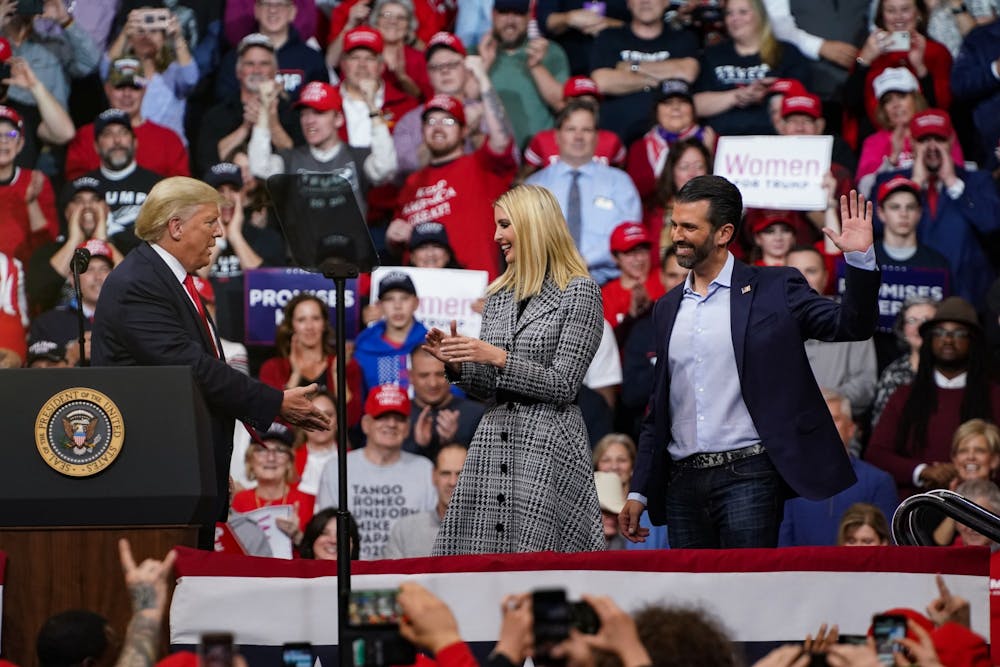
Donald Trump Jr. and Ivanka Trump attended the rally of their father, President and 1968 Wharton graduate Donald Trump, in New Hampshire on Feb. 10, 2020.
Credit: Chase SuttonThis week, 1968 Wharton graduate and President Donald Trump, along with his son, 2000 Wharton graduate Donald Trump Jr., continued their pattern of spreading misinformation on social media.
Since the COVID-19 pandemic began, viral misinformation has run rampant and indirectly led to numerous coronavirus-related deaths, BBC reported. Conspiracy theories related to mitigation techniques and the severity of the virus continue to spread on the internet, some which are most notably shared by members of the Trump administration.
On Tuesday, Trump Jr. tweeted a viral video featuring medical professionals stating misleading information about the coronavirus pandemic and labeled it a “must watch!!!" The president then proceeded to share it himself.
Hours later, Twitter suspended Trump Jr.'s account for 12 hours for violating "Twitter Rules," and removed Trump's tweets that shared versions of the video. The video, which was published by the right-wing outlet Breitbart News, was also removed by Facebook and YouTube this week after garnering tens of thousands of views, The Hill reported.
On July 30, Trump took to Twitter to float his idea of postponing the upcoming 2020 election to avoid it being the "most INACCURATE & FRAUDULENT Election in history." The president holds no power over the date of the election, as it is under Congress' purview, and mail-in balloting has repeatedly shown to be safe and in no way fraudulent.
Trump's tweets regarding a possible election postponement come as he continues to trail Democratic candidate and former Penn Presidential Professor of Practice Joe Biden by 14 points, according to an Ipsos poll.
In an op-ed published in The Hill earlier this year citing data published by The Heritage Foundation, Amber McReynolds, a former Denver election official, and Charles Stewart, director of the MIT Election Data and Science Lab, wrote that there have been 143 convicted cases of fraud using mail-in ballots over the past 20 years. That comes out to about 0.00006% of total votes cast resulting in fraud.
"There is no evidence that mail-balloting results in rampant voter fraud, nor that election officials lack the knowledge about how to protect against abuses," McReynolds and Stewart wrote.
Despite overwhelming evidence against claims that mail-in balloting is fraudulent, Trump's Thursday tweet is not marked with any sort of misinformation label that has previously been used by Twitter, and his account has likewise not been suspended.
Why? It's still unclear.
In efforts to combat misleading information posted to its platform, Twitter announced a policy in May that laid out a series of rules it would apply to future posts that include untrue claims.
Trump's posts have since been restricted by the social media platform.
Similar to his post this week regarding the upcoming election, Trump railed against mail-in balloting earlier this year in a series of tweets which read, "There is NO WAY (ZERO!) that Mail-In Ballots will be anything less than substantially fraudulent." These tweets currently feature labels reading 'Get the facts about mail-in ballots.'
Spreading misinformation is nothing new for the president or his son. According to The Washington Post's Fact Checker database, the 1968 Wharton graduate has made 20,055 false or misleading claims since he took office in 2017. His most frequent false claims regard the strength of the economy, the border wall, and tax cuts.
Americans' level of dissatisfaction with President Trump has reached an all-time high according to a July 27-28 national poll conducted by Ipsos, a global market research and a consulting firm. Only 38% of Americans approve of the president, according to the poll, primarily citing concerns about the nation's economy, jobs, and healthcare.
Trump currently holds a 38% approval rating among Pennsylvanian voters as well, the Ipsos poll reported. According to a Franklin and Marshall College poll of registered state voters in July, Biden has a nine-point lead against Trump in Pennsylvania.
While voter registration numbers typically increase before a presidential primary, Pennsylvania witnessed a decline in voter registrations this year due to coronavirus social distancing restrictions, which prohibited various campaigning strategies. In Pennsylvania's 2020 primary election, 6.5% fewer Democrats and 29% fewer Republicans voted than in the state's last presidential primary.
Approximately 706 Penn students voted in the 2020 primary election, however, which is over five times as many as the number of students who voted in April 2012, the last re-election of a presidential candidate primary.
The Daily Pennsylvanian is an independent, student-run newspaper. Please consider making a donation to support the coverage that shapes the University. Your generosity ensures a future of strong journalism at Penn.
Donate







